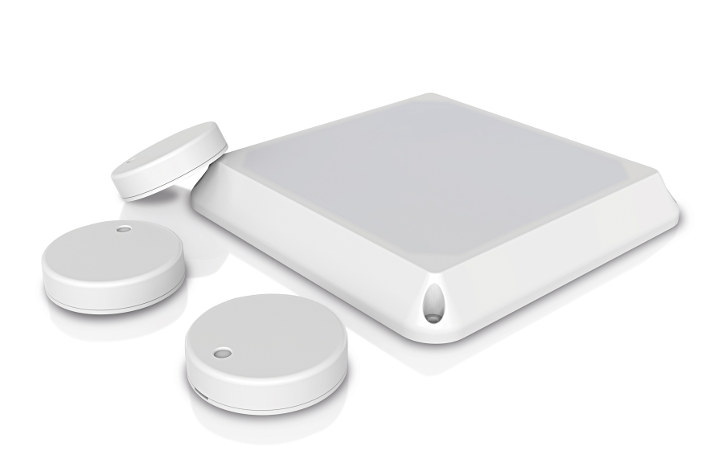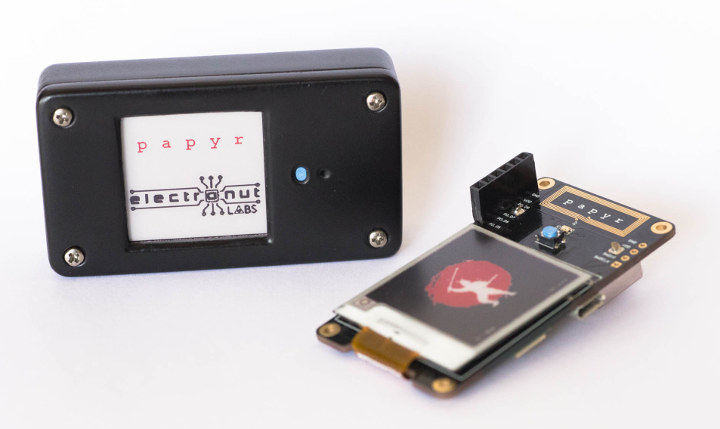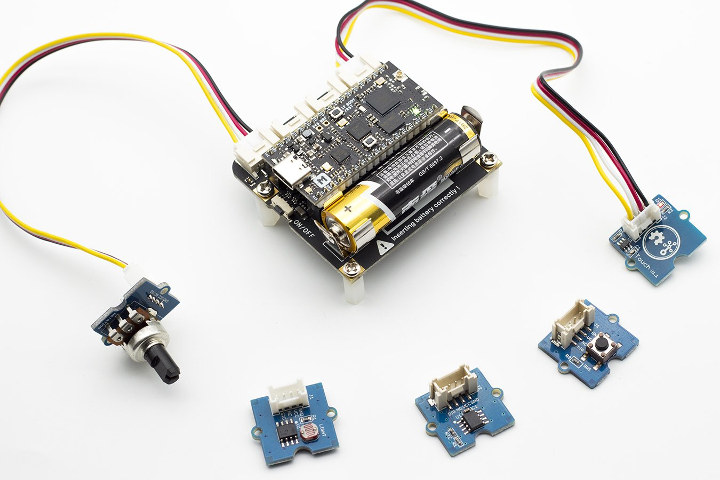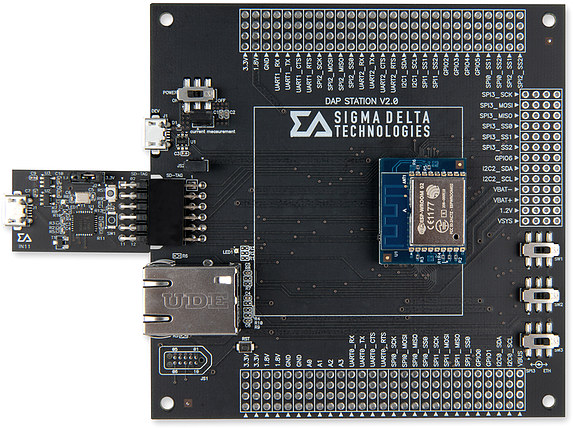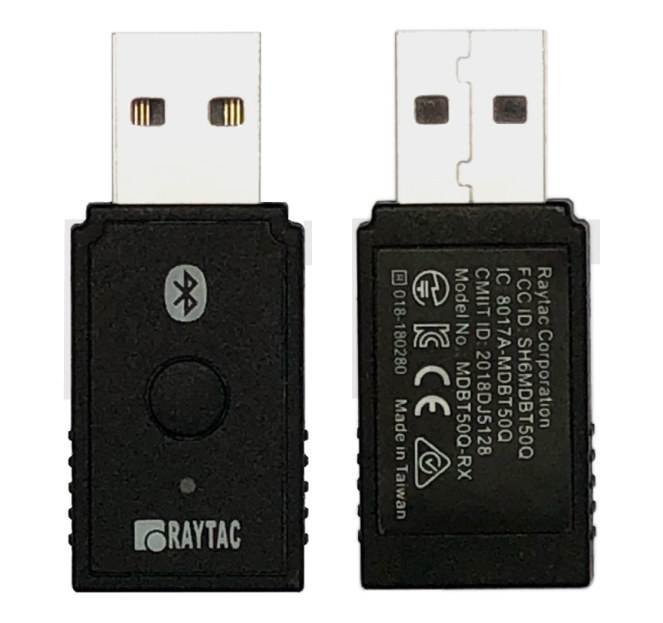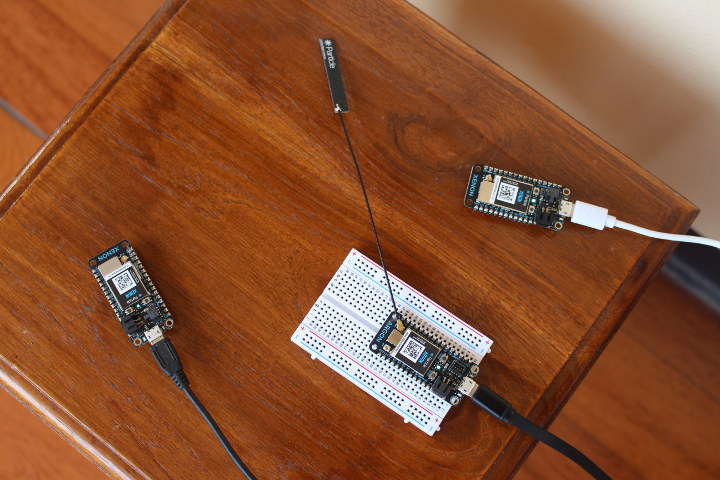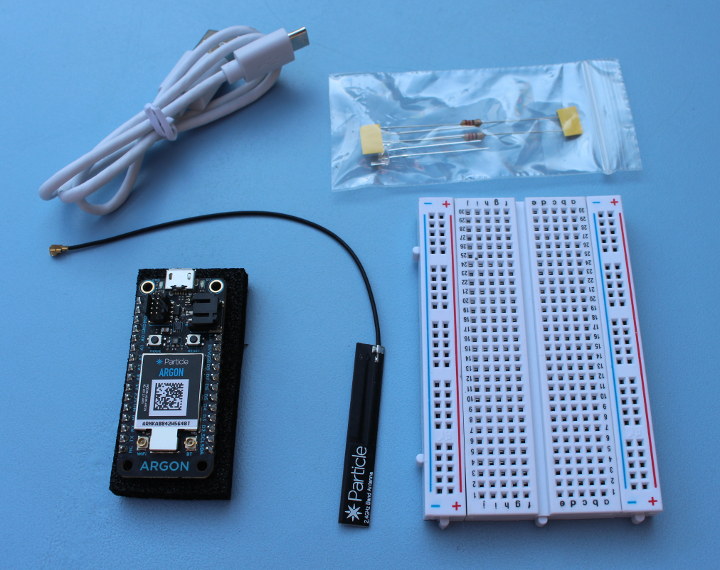Back in 2016, we covered Ruuvi Innovations’ Ruuvitag open source Bluetooth & NFC sensor beacon is based on Nordic Semi nRF52832 Bluetooth SoC. The company has now introduced Ruuvi node, another open source multi-purpose, industrial-grade cellular gateway, environmental sensing, and asset tracking node solution based on not one, but two Nordic Semi chips with nRF91 cellular IoT SiP (System-in-Package) with NB-IoT and LTE M (eMTC) connectivity and nRF52840 multi-protocol Bluetooth 5.0 SoC. It’s an early announcement with the launch of the first pilots of Ruuvi Node planned for Q2/Q3 of this year, so the full specifications are yet to be released. However, thanks to a press release on Nordic Semi website, we do know that Ruuvi Node is meant to be maintenance-free, will include a solar panel for energy harvesting (which mean the included 45Wh battery may never run out depending on the application), several environmental sensors, GPS positioning provided […]
Papyr is a Nordic nRF52840 based Bluetooth/802.15.4 ePaper Display
Electronut Labs has designed a Nordic Semi nRF52840 boards featuring a black, red, and white e-Paper display. Papyr board supports both Bluetooth LE (BLE5, BLE Mesh) and 802.15.4 (Thread, Zigbee) connectivity, and can be controlled via an Android app, with iOS support coming later on. Papyr hardware specifications: Wireless Module – Raytac MDBT50 module with Nordic nRF52840 BLE/802.15.4 SoC (as used in Raytac MDBT50Q-RX Bluetooth 5 LE USB adapter) Connectivity – Bluetooth 5 LE/Mesh, 802.15.4 (Thread/Zigbee), NFC (PCB antenna) Display – 1.54″ 200×200 pixel red/black/white epaper display USB – 1x micro USB device port Expansion – Extra GPIOs via 2.54mm header Debugging – SWD Programming header Misc – RGB LED, push button, USB/Battery power switch Power Supply – 5V via USB, or CR2477 coin cell Dimensions – 65 x 35 mm You can control the board using Electronut Labs app for Android. Three features are supported at this stage: Draw, […]
nRF52840 MDK Base Dock Adds AA Battery Holder, Grove Connectors
Makerdiary nRF52840 Micro Development Kit (MDK) is a breadboard-friendly devkit for Nordic Semi nRF52840 multi-protocol wireless SoC that supports Bluetooth 5.0, Thread, IEEE 802.15.4, ANT, and 2.4GHz proprietary, and various popular frameworks or OS such as Arm Mbed OS, or the Zephyr Project. nRF52840 MDK Base Dock makes development just a little easier, by adding an AA battery holder, and four Grove connectors compatible with Seeed Studio’s Grove modules. nRF52840 MDK Base Dock specifications: Dual 2×18 Socket Headers compatible with nRF52832-MDK & nRF52840-MDK 4 Grove connectors with selectable UART/I2C/I2S/PDM/QDEC/SPI/ADC NFC tag-A PCB Antenna Power Power button with latching circuit AA battery holder Synchronous, Step-up Converter with VIN>VOUT Down Mode Operation 0.8V-to-4V Input Range 3.3V Output with Over-Current Protection Battery level sensing with 1:2 voltage divider on AIN2 Low power consumption: 5uA Shutdown Current; 145uA Idle Current Dimensions – 58mm x 54mm x 17mm The board also adds an NFC PCB […]
Obvious is an App Store for Embedded Devices
Mobile devices have gotten their own app stores for more than 10 years already, with Google Play for Android and Apple App Store for iPhones and iPads. Linux powered IoT devices – usually gateways – also got their own app stores with branded Ubuntu app stores relying on Ubuntu Snaps, although I’m not sure they are widely used. However, low power embedded devices usually based on microcontrollers did not get their own app store, and Obvious aims to fill this gap with the Obvious platform, an app store for embedded devices, which enabled after-sales features and upgrades. Obvious app store is currently in Beta and works exclusively with Nordic Semi based products at this stage. We don’t know an awful lot about the services, except it will enable a new revenue stream for providers of low power wireless IoT devices. Some benefits listed by the company include: Untapped resources – […]
SDTxArm Pelion Kit is a Modular IoT Devkit Designed for Arm Mbed Cloud Platform
South Korea based Sigma Delta Technologies’ SDTxArm Pelion Kit is a modular development kit comprised of a baseboard, as well as CPU and interface modules that is specifically designed to work with Arm Pelion cloud based device management service and Mbed OS for wearables and IoT applications. DAP (Debug Access Port) Station Ver.2 baseboard key features and specifications: USB – 1x micro USB 2.0 port Expansion I/Os via rows of through-holes 3x UART Interfaces 4x SPI Interfaces 3x I²C Interfaces 7x GPIO 4x analog inputs Debugging / Programming 1x TC2050 tag connection designed to allow programming without purchasing additional Interface if the user already has an appropriate Interface Module from other companies. I assume this is related to Tag Connect TC2050-IDC. 1x SD-TAG with JTAG/SWD signals Power Supply – 5V via micro USB port The DAP station takes an SDT Board (i.e. CPU board), as well as an interface board […]
Raytac MDBT50Q-RX Bluetooth 5 LE USB Adapter Features nRF52840 WiSoC
Bluetooth 5 has been around for a while, but apart from MakerSpot CC2640 Bluetooth 5 USB dongle and Nordic Semi nRF52840 USB Dongle both for developers (and without case), it’s been hard to find Bluetooth 5 USB adapters. So far the only proper BT 5.0 USB adapter for consumers that’s easily purchasable I know of has been Fanstel USB840F available for about $18 plus shipping. Soon enough there should at least another alternative with Raytac MDBT50Q-RX Bluetooth 5 USB adapter- also based on Nordic Semi nRF52840 WiSoC – that the company very recently announced. Raytac MDBT50Q-RX BT 5 dongle main features and specifications: Bluetooth 5 Module – Raytac MDBT50Q-P1M Nordic nRF52840 SoC Arm Cortex-M4F MCU with 1MB Flash memory, 256kB RAM Connectivity – Bluetooth 5 Certified, supports BT5 Long Range Feature Bluetooth Low Energy, ANT+, Zigbee, Thread (802.15.4) Certifications – FCC, IC, CE, Telec (MIC), KC, SRRC, NCC, RCM, WPC […]
Particle Mesh Networking Review – Part 2: Getting Started Guide with Argon & Xenon
I’ve recently received a Particle Mesh IoT Development Kit with one Argon WiFi + Mesh (802.15.4) board acting as gateway, three Xenon Mesh boards, and various sensors and accessories. I’ve already showcased the hardware in the first part in the review, so in this post I’ll post my experience getting started with Particle Mesh networking using the kit. Beside the kit, you’ll need a few micro USB cables, a mobile phone running Android or iOS, a reliable Internet connection (more on that later), and a host PC for programming and debugging potential issues. Setting Up Particle Argon & Xenon boards First we’ll need to configure / setup the boards. Go to https://setup.particle.io to login or create an account if you don’t already have one, and you should be brought the following page. Select Mesh, and you’ll be asked to setup a gateway first. Any of the boards from Particle Mesh […]
Particle Mesh IoT Development Kit Review – Part 1: Unboxing
Back in February of this year, Particle introduced three low cost IoT development boards based on Nordic Semi nRF52840 wireless chip supporting “Particle Mesh” networking based on the 802.15.4 radio in the chip and OpenThread implementation of Thread IoT communication protocol. The company recently announced they were now shipping the kits pre-ordered earlier this year, and released two IoT development tools based on Node-RED and Visual Studio Code. Particle contacted me as well as to find out whether I was interested in reviewing their latest WiFi / Bluetooth / Mesh kit, and I’ve just received the bundle, which comes with a bunch of items, so I decided to write an unboxing post first to have a first look at the hardware, before playing with it in one or two weeks. Particle Mesh IoT Development Kit Bundle Unboxing That’s what I got from UPS… From top left to bottom right: The […]


